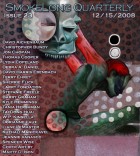We’ve all passed homeless people and gave them something or thought to. In this story the narrator hands over not just her coat, but her shoes too and continues onto work. Did an experience provoke the idea for this story or where did the inspiration come from?
This story came from a flash prompt writing session with my writing group here in Jerusalem: the host prepares a set of six or seven words or phrases, generally taken from books or poems, and we have twenty minutes to write, trying to insert as many of the phrases as possible. I generally write a complete flash story in that twenty minutes, and the varied nature of the prompts brings out something quite strange in me! So “coat and shoes” was one of the prompts, and this is where it took me. It’s purely fictional, I’ve never done anything like this. I’ve only tried consciously to write from life once or twice and am always embarrassed and uncomfortable with the results. I much prefer being in my imagination.
The narrator is “not one to… not one who…” You’ve brilliantly used unfinished sentences in this story, sentences that have no need to be completed, as the point is clearly made and dialogue understood. Why in this story did you choose this technique?
I wrote this story in twenty minutes, without stopping, and didn’t make any conscious choice of technique, but writing unfinished sentences is something I have been doing a lot of lately. It seems more real, less neat-and-tidy; this is how we think, this is how we talk. I don’t like neat. I don’t like tidy. I am moving more towards minimalism and ambiguity in my stories, and not finishing sentences certainly makes the reader work a little harder, having to peek between the lines to understand what might be going on, especially in flash fiction where so much is condensed into a small and intense space. Coincidentally – or perhaps it is no coincidence – I just read a piece in Conjunctions magazine by the poet Brenda Hillman where she says: “…the sentence is not a requirement for thought, and, in fact, sometimes the brief spurts, the more abstract or difficult fragments can speak to conditions of human suffering in ways that are useful to the average person because they are brief and pure. Floating shards of a wreck that are whole.” Can’t really put it better than that.
The line, “She had my coat and shoes, wasn’t that enough?” Could you talk about that line, does it represent something larger?
Wow, I have never been asked to talk about one line from a story. Looking back on it, it guess it is about feelings of responsibility and about guilt. This main character in my story seems rarely to do anything spontaneous, but the fact that she is walking to work from a new direction signals that today is already different. It turns out to be very different. She gives to someone, gives the very coat off her back and gives her shoes, making her naked, vulnerable. A very worthy act, no? But almost instantly she feels that this wasn’t enough, is already hearing the voices that will judge her. Isn’t that always the way? It’s those voices that we hear in our head, the nagging, the criticising, that don’t leave us alone, that don’t allow us to accept “what is” instead of worry about what could have been, how we could have been better, better, always better.
Recently, your collection “The White Road and Other Stories” has been released by Salt Modern Fiction. Congratulations! What can you tell us about the collection and how has the experience been so far?
It’s amazing. A 30-year-old dream come true. To hold my book in my hands, I still haven’t taken that in, still stare at it and it seems like a mirage. At the same time, in one way it has been difficult, because when your dream comes true, what do you do next? I didn’t have a game plan when I was offered the book deal, no ideas for what to do next, really. It’s been 18 months and I am still not sure. Also, everything everyone told me about the distraction of having a book published is true: I am spending an enormous amount of time and energy trying to get the book out there, to find innovative ways to market it, since my publisher is a small press, dynamic and innovative but overworked and spending all of their time producing their next beautiful books. I don’t have marketing skills, I am having to make this up as I go along! I am mid-virtual book tour, visiting 11 blogs around the world in 3 months, and while this is a wonderful experience, I am a writer who would far rather hide away in a small, dark room with the voices in her head than say “Please buy my book.” But to have a book and not find ways to get it read is ridiculous, a waste of the effort Salt put in. So: “Please buy my book.” There. Done. Thank you!



